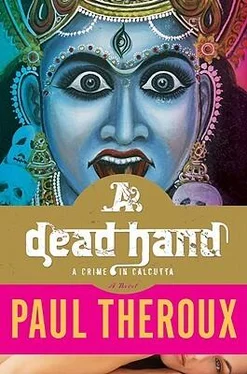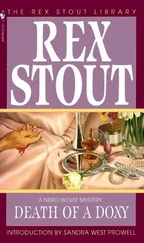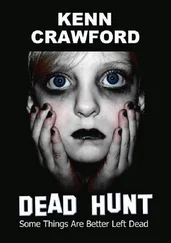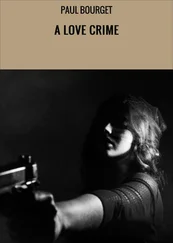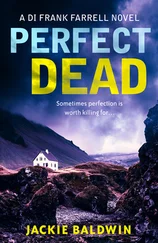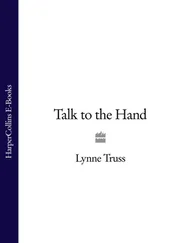"Cricket," I said.
"That's not a sport. It's a game that hardly requires fitness. Apart from the man that throws the ball, it's mostly standing around. You never see an Indian kicking a ball or running. Punjabis are tall. But where are the basketball players? Where are the marathoners? Over a billion people and they can't win an Olympic medal."
"I did a story on this once. They average about one medal in each Olympics."
"One!" she screamed. "In what sport?"
"Shooting an air rifle."
"That's my point! You can be a fat air-rifle shooter!" This fact delighted her. "They are weirdly shaped, either stuffed or skinny. Is it sexual? I sometimes think so. Of course, Indian girls can look heartbreakingly beautiful, but the women look fat and frustrated, the men look angry, the boys look wretched and onanistic. The eternal question for an Indian traveler is 'Where will we eat?'"
"Americans say the same thing."
"I know. Americans are fat too, not from frustration but from excess. The poor are fat in America. The rich are thin. It's the awful food there. Not like this."
She was chewing as she spoke, as though to prove her point. "This is so pure. I can see by your slightly puffy eyes that you don't have good kidney function. But after you get a thorough checkup, establish your body type and your chakras, you'll be on the right path."
"You're taking me by the hand, I see."
"It'll do you good. Each of these dishes has value and balance."
I swallowed, trying to convince myself, and said, "I see."
"It's almost sacramental, eating like this. Think of your body."
Her saying that made me conscious of her lovely body, her hand dipping into the rice, making a ball of it, dipping it into the lentils. Thomas Metcalfe, of the governor general's office, could not bear to see a woman eat cheese. I guessed it was not disgust, but probably aroused something in him. Sitting with Mrs. Unger, I realized I loved to watch a pretty woman eat, especially messy food, her trying to be dainty over it and failing, the flecks of food on her lips, the chewing, the neck sinews tightening with a swallow. I could see more: Mrs. Unger's stomach muscles framed by the bodice of her sari and her wraparound. The pleasure of her eating was also the pleasure I took in admiring her good health. She sat upright with strength and grace, using her fingertips on the rice, the dripping okra, the mushy peas. And I was aroused by the small splash of food on her lower lip, her lapping at it like a cat, making the lip gleam.
"I assure you that tonight you'll sleep like a baby."
The old man came over to make sure we had everything we wanted. He chatted cozily but with respect to Mrs. Unger. He directed the girl to refill our glasses of lime water. I struggled to eat a believable portion; the tang of soil lingered on the unsalted, spiceless food.
When the old man had gone, she said, "Do you get regular massages?"
"I wish I did."
"That's what you need."
All this time I had feared that she would ask me again about what she mentioned in her letter, the body in the hotel room, Rajat's worry, the danger for him. But she said nothing more about the letter, which when I had received it seemed so urgent.
"You should have a massage. I know just the place."
She fluttered her fingers in a bowl of water, and as she did so the Indian girl appeared behind her with a towel. After drying her hands, Mrs. Unger took a pen and pad out of her bag and wrote down a name. The purple ink and her loopy handwriting reminded me of her letter.
"Morning is best. Have a light breakfast. Be at this place at ten."
As she gave me the piece of paper, I laughed because she was bossy in such an appealing way, mothering me with concern and care.
She said, "I hope your friends won't mind my taking charge of you."
This seemed to me an odd remark, at once full of confidence, presuming on me. Yet her assurance made me wary. Confident-seeming women often made encumbering statements like this when deep down they were uncertain, the sort of overfamiliar bluster that was easily punctured by a sharp reply.
Instead of embarrassing her by game-playing, I said, as politely as I could, "I wish I knew which friends you mean."
I wasn't offended. I was in Calcutta, living by my wits. I was seriously interested in which people she might mean. But even my polite response made her shy, as though I'd been blunt.
"The folks on Ho Chi Minh Sarani, maybe."
That made no sense to me, and I couldn't help smiling. Yet she was smiling back at me in a kind of challenging suggestion that she knew more than I'd guessed.
"Where's that?"
"The American consulate."
"Is that the name of that blocked-off street?"
"You must have been there many times, you're so popular."
"Yes, but someone else was doing the driving," I said.
"That's the mixed blessing of being in Calcutta. Someone else is always doing the driving."
The ambiguity of this made me pause. I didn't have a reply to it, though I knew I'd remember it. I said, "So that's how you knew where to find me with your letter."
I felt obvious and fooled with the conceit that I'd attributed it to my high visibility as a big pink ferringhi. But she dodged that — this had become a fencing match — and said, "I don't have much to do with those people. But I know how greatly they value you."
"Really?" I said, mildly surprised because I'd never been convinced that Howard took me seriously as a writer. He liked my availability, and that I was willing to give pep talks at colleges at short notice, a volunteer speaker, glad for the per diem, who was not terrified by Calcutta, helping him do his job.
"Oh, yes," Mrs. Unger said. "They're big fans. You know that Indians are very suspicious of the Americans that come out here, especially the ones sponsored by the U.S. government. They have a long history of being patronized. The consulate regards you as a friend who won't let them down."
"And what do they think of you?"
"I don't exist for them. But I'm glad you do. I'm glad your writing means something to them."
Once again I wanted to say: I have no writing, I have a dead hand, I am out of stories, I have stopped believing. And maybe it will never happen. I didn't have much to write about at the best of times, and now it's done. But I had also thought, when I'd reflected on my dead hand: A writer without an idea, without the will or the energy to write, is someone in need of a friend.
Nelson Algren had had friends, cronies, gambling pals, drinking buddies, and though he wrote nothing in his last years, he'd had companions. William Styron did not write anything in the last fifteen years of his life. His dead hand hadn't hastened his death; it had made him immensely gloomy, paranoid, and impatient, longing to write yet incapable of it. But he had been surrounded by a doting family and a loving wife. I had no writing, I had no one, I was alone with my dead hand.
So I said, "I'll be there." Then I said, "Shall I call you Merrill?"
"Call me Ma." And she looked closely at me. "Everyone does."
It was a word that had always made me uncomfortable, so I resisted saying it, yet I allowed myself to be swept up. And it was all unexpected, which was why it was so pleasant: the drink, the meal, and now this appointment for a massage.
I wondered if I looked so idle as to agree to so much at short notice. I hoped she understood that I was interested in her, even if I was bewildered by the story of the corpse in the hotel room. I was glad to have found her, and it seemed — I was sure of this — I was making her happy too. She had praised my work; she knew I had friends at the consulate. She seemed glad I had come. You go away to be anonymous, but sometimes the opposite happens: you excite interest, even in big, villagey India, in the stew of Calcutta.
Читать дальше
